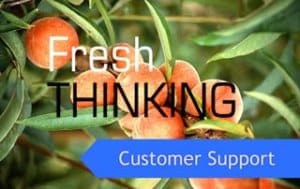Fresh Thinking in Data Management
 At OpFocus we have a very methodical approach to problem solving. Our techniques have been honed from many thousands of hours on a wide variety of projects. In many respects our process is quite scientific in nature. However, we never assume that we have all the answers. As our company grows we naturally look to deepen the types of talent we hire to cultivate a culture of fresh thinking. It is in this spirit that we are taking a slight departure from our productivity focused blog posts to interview one of the newest members of our team.
At OpFocus we have a very methodical approach to problem solving. Our techniques have been honed from many thousands of hours on a wide variety of projects. In many respects our process is quite scientific in nature. However, we never assume that we have all the answers. As our company grows we naturally look to deepen the types of talent we hire to cultivate a culture of fresh thinking. It is in this spirit that we are taking a slight departure from our productivity focused blog posts to interview one of the newest members of our team.
David Carnes. OpFocus, Inc. President & Founder.
I am a fresh college graduate with a degree in sociology now working in data management. Although I have no formal training in data management, I’ve come to realize that there are many correlations between these seemingly disparate disciplines.
1. Analytics and Communication
In sociology, the use of empirical evidence to assess a theoretical argument or conceptualize a problem is essential, just as it is with data management. Research typically involves an extremely high level of data gathering and analysis. When conducting research, I frequently evaluated multiple sets of data, which existed in a variety of forms, from statistical values to survey responses. Upon the completion of an analysis, sociologists need to decode and explain their findings effectively. Any research is pointless if no one else understands its findings and relevance. As a student, I learned to prepare and present reports. I never would have guessed that the preparation and presentation skills I acquired as a student would serve me so well in my new role.
2. Project Formulation
Planning is imperative before starting any (research) project… otherwise, things will get messy. Learning how to design a project before data collection was something I learned early at school. It often means asking the most obvious questions, like what do I want to obtain from my project?, developing research strategies, and writing research proposals. Additionally, I had to learn that my projects, like anything else, had limitations in what they could and couldn’t accomplish; a hard, but necessary, lesson to learn for a meticulous person. In terms of data management, a plan can make or break a project, so it’s crucial to make a project design thorough and sufficient from the get-go.
3. Long-term Project Coordination and Management
While I still can’t juggle chainsaws, sociology has helped me develop the ability to juggle multiple projects. Many of my research projects overlapped. I learned to coordinate each, planning the different timeframes, scheduling social experiments, seminar discussions and survey labs, and keeping track of everything in my notes. These same skills are ever present at OpFocus with multiple projects and their respective timeframes.
4. Comprehension of Social (Group) Dynamics
Although this final sociological skill does not directly aid data management, it does come in handy when interacting with clients and coworkers. Sociology, or the study of social groups, structures and issues, encourages those who study it to maintain an awareness of intercultural and global social dynamics. A good sociologist can possess interpersonal attributes like empathy and tolerance towards diversity, as well as cross-cultural understandings of racial, ethnic, age, class and gender differences in the work environment. These qualities can become central to data management in terms of nurturing client relationships and building rapport amongst coworkers. The ability to work cooperatively with others and to connect with clients/coworkers ultimately supports the functionality of any data management business.
A good sociologist can possess interpersonal attributes like empathy and tolerance towards diversity, as well as cross-cultural understandings of racial, ethnic, age, class and gender differences in the work environment. These qualities can become central to data management in terms of nurturing client relationships and building rapport amongst coworkers. The ability to work cooperatively with others and to connect with clients/coworkers ultimately supports the functionality of any data management business.
I’m finding the skills I gained through my experiences as a sociology major are a lot more applicable to my career than I previously imagined.
Interested in a career at OpFocus? – Check out our open positions.
Photo credit: By Keith Weller, U.S. Department of Agriculture [Public domain], via Wikimedia Commons



